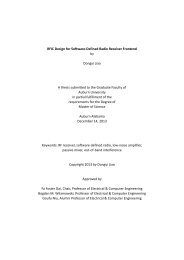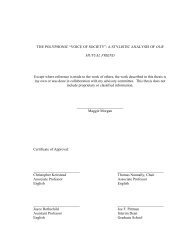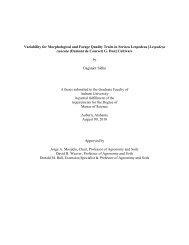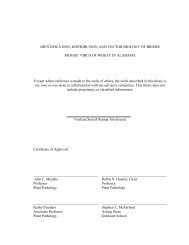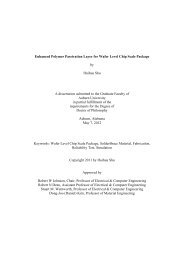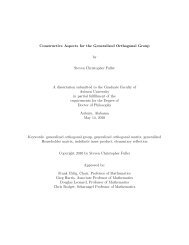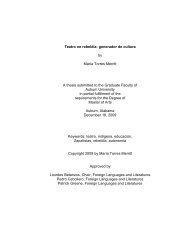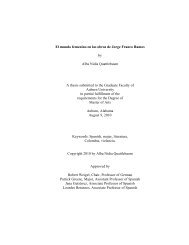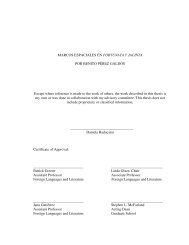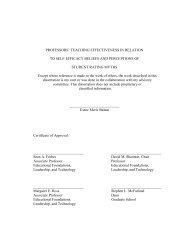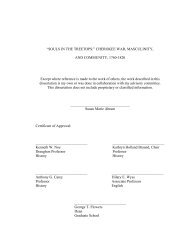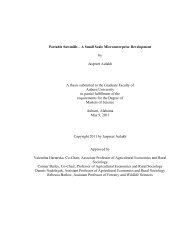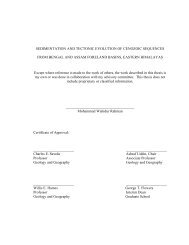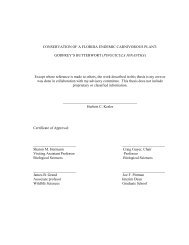the trouble with gender in othello - Auburn University Electronic ...
the trouble with gender in othello - Auburn University Electronic ...
the trouble with gender in othello - Auburn University Electronic ...
Create successful ePaper yourself
Turn your PDF publications into a flip-book with our unique Google optimized e-Paper software.
Notes<br />
1 In this section of her book, Lenker discusses <strong>the</strong> major historians of <strong>the</strong> family <strong>in</strong> <strong>the</strong> early<br />
modern period: “The most extensive works to date on <strong>gender</strong> and family dynamics are<br />
Lawrence Stone’s The Family, Sex, and Marriage <strong>in</strong> England 1500-1800 (1977), Alan Macfarlane’s<br />
Marriage and Love <strong>in</strong> England: Modes of Reproduction 1300-1840 (1986); and David Cressy’s Birth,<br />
Marriage, and Death: Ritual, Religion, and <strong>the</strong> Life-Cycle <strong>in</strong> Tudor and Stuart England (1997)<br />
2 For a full discussion of early modern views of <strong>in</strong>terracial eroticism, particularly those perta<strong>in</strong><strong>in</strong>g to white<br />
women <strong>with</strong> black men, see Daileader’s Racism, Misogyny, and <strong>the</strong> O<strong>the</strong>llo Myth.<br />
3 Food for Thought: How much of <strong>the</strong> audience’s sympathy for Desdemona would dissipate if<br />
we did not have <strong>the</strong> benefit of know<strong>in</strong>g that <strong>the</strong> ocular proof is mislead<strong>in</strong>g? How much would<br />
<strong>the</strong> audience’s sympathy for Iago grow if we had some ocular proof that O<strong>the</strong>llo had, <strong>in</strong> fact,<br />
been <strong>in</strong>timate <strong>with</strong> Emilia? Daileader demonstrates that <strong>the</strong> idea of bloody revenge for <strong>the</strong> sexual<br />
transgression of a woman is still prevalent and deemed natural today “<strong>in</strong> a s<strong>in</strong>gle comment by<br />
one of my undergraduate students: ‘If my wife cheated on me, I’d kill her.’” P 2.<br />
4 This use of “paper” and “book” is <strong>in</strong>terest<strong>in</strong>g <strong>in</strong> light of Desdemona’s many transgressive<br />
speech acts, as it is words that appear most often on paper and <strong>in</strong> books, and it is words that are a<br />
large part of Desdemona’s transgression.<br />
5 Kahn co<strong>in</strong>s this phrase as part of her explication of Madelon Gohlke fem<strong>in</strong>ist-psychoanalytic<br />
read<strong>in</strong>g of Shakespeare, “ ‘I wooed <strong>the</strong>e <strong>with</strong> my sword’ Shakespeare’s Tragic Paradigms”.<br />
(Represent<strong>in</strong>g Shakespeare: New Psychoanalytic Essays. Ed. Murray M. Schwartz and Coppelia<br />
Kahn. Baltimore; The John Hopk<strong>in</strong>s <strong>University</strong> Press. 1980.): “Madelon Gohlke outl<strong>in</strong>es a<br />
paradigm of mascul<strong>in</strong>e identity <strong>in</strong> Shakespeare that illum<strong>in</strong>ates this aspect of cuckoldry. For a<br />
Shakespearean hero, to be betrayed by a woman, she argues, is to be humiliated or dishonored,<br />
and thus placed <strong>in</strong> a position of vulnerability that makes him psychologically like a castrated<br />
man, and thus womanish. […] To be betrayed by a woman thus threatens a man’s very<br />
mascul<strong>in</strong>ity—his identity as a man” (emphasis m<strong>in</strong>e)<br />
6 This confluence of occupation and manhood can also be seen <strong>in</strong> O<strong>the</strong>llo’s “Farewell! O<strong>the</strong>llo’s<br />
occupations gone.” III.iii.273<br />
7 “O<strong>the</strong>llophilia, <strong>the</strong> critical and cultural fixation on Shakespeare’s tragedy of <strong>in</strong>ter-racial marriage<br />
to <strong>the</strong> exclusion of broader def<strong>in</strong>itions, and more positive visions, of <strong>in</strong>ter-racial eroticism. […] <strong>in</strong><br />
Anglo-American culture from <strong>the</strong> Renaissance onward, <strong>the</strong> most widely read, canonical<br />
narratives of <strong>in</strong>ter-racial sex have <strong>in</strong>volved black men and white women, and not black women<br />
and white men, […]Whatever Shakespeare’s po<strong>in</strong>t <strong>in</strong> tell<strong>in</strong>g <strong>the</strong> story, it has served well as<br />
cautionary tale for white women.<br />
40



